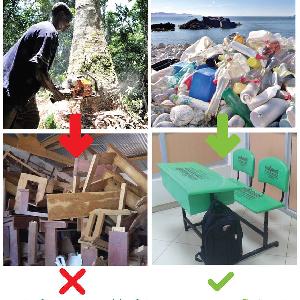Please find below the
Finalist Evaluation
Judges'' comments
The proposal overall is appealing, has merit, and addresses some of the obstacles. Reducing the number of trees cut down for desks while dealing with a growing plastic waste problem as an idea holds promise.
The Judges would have liked to see practical information or guidance on 1) the specific plastics to be used, 2) an outline of the recycling processes that would be or may be employed, 3) the transportation aspects of those processes, 4) the specific equipment to be employed or its cost, or 5) the energy requirements for the recycling process or processes.
The Judges also felt the proposal would have benefited from a clear budget.
Semi-Finalist Evaluation
Judges'' ratings
| • | Novelty: | |
| • | Feasibility: | |
| • | Impact: | |
| • | Presentation: |
Judges'' comments
Thank you for your proposal to the Climate Colab contest. Here are a few questions to push the thinking of your proposal:
1. Can you compare the utility of these student desks compared to energy, for example, or other output applications?
2. Is the quality of the incoming plastic good enough for the desks? what filtering is required?
3. How about applications other than school desks, could these be explored?
Best of luck for the next round of iteration!
 Mwangi Mwangi Jun 15, 2016 04:43 | Proposal creator As a startup, we will start with recycling plastic for school desks because of the current high demand of school desk. Moreover, this model tackles three very critical challenges in Kenya which are waste management, deforestation and poor learning conditions in both primary and secondary schools. Recycling plastic waste to manufacture school desks through injection molding has a far larger energy utility than, using the same plastic to manufacture other products like plastic post and roofing tiles which are manufactured through extrusion, which is prone to higher energy losses. In future, we will incorporate additional construction materials such as road signage, fencing posts and lumber, which can make ceilings and tables. Eco-dawati is mainly interested in post-consumer PET i.e Polyethylene terephthalate ( PET ) for recycling and manufacturing these products. Filtering will be done through manual sorting. |
